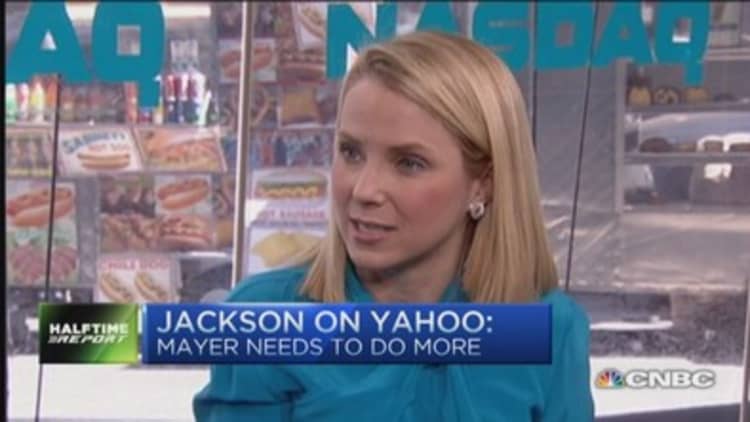
Yahoo CEO Marissa Mayer gave shareholders what they wanted, but they didn't stay happy for long.
Shares of the embattled Internet company jumped by as much as 8 percent in after-hours trade Tuesday after it announced it would spin off its entire stake in China's Alibaba Group to shareholders. The move was applauded because it will save well over $10 billion in taxes that the company would have incurred through a traditional sale of the stake.
But in the last couple of days, the stock has given all of the gains back—and much more. In midday trading Thursday, the stock traded at $43, down about 15 percent from after-hours levels on Tuesday.
What happened? The majority of the move was due to a decline in the value of Alibaba shares, which tumbled about 10 percent Thursday morning after the company reported disappointing results. The Chinese e-commerce giant continues to account for the vast majority of Yahoo's valuation, so the stocks will usually move in tandem.
But that's not the whole story. Using some assumptions and sum-of-the-parts math, it's possible to calculate the implied value of the core Yahoo business. As it turns out, the value of the core business has declined by almost $3 per share since Tuesday.
Read MoreYahoo's Mayer saves job with Alibaba spin
Here's how the math works: On Tuesday night, Yahoo's stake in Yahoo Japan was worth about $7 per share, its net cash was worth about $6 per share and the Alibaba stake was worth about $41.50 per share. With the stock trading at $51, the core business was worth negative $3.50 per share. Applying updated share prices for Yahoo and Alibaba, core Yahoo has swung to a valuation of negative $6.30 per share. (Core Yahoo's value looks slightly higher if you assume a discount on the value of the Alibaba and Yahoo Japan stakes to account for how they might trade as "spinoff" companies.)
Clearly, the core business is worth much more than zero. Yahoo investors interviewed by CNBC along with some Wall Street analysts say the core business is realistically worth around five times earnings before interest, taxes, depreciation and amortization. That suggests a valuation of about $6 per share.
Why the disconnect? Investors say they are concerned about shrinking profits in the company's core business. Yahoo projected a decline in EBITDA for the first quarter and investors don't appear hopeful for a turnaround anytime soon. Indeed, consensus estimates reflect a 15 percent decline in EBITDA in 2015.
In fairness, there are some promising signs: The company said Tuesday it expects revenue from new areas like mobile, video and social to offset traditional display revenue declines in 2015.
The big question is how much time investors will give Mayer before they grow impatient. Some large Yahoo investors interviewed by CNBC said the Alibaba spinoff is sufficient to protect Mayer and the current Yahoo board from opposition during the upcoming proxy season. Shareholders are allowed to nominate new directors before a deadline of March 27.
Read MoreHow Yahoo may finally be sold: Why March 2015 is key
But one key shareholder has yet to speak up. Activist investor Starboard Value, which revealed a Yahoo stake last fall, has pushed for the Alibaba spinoff as well as a divestment of the Yahoo Japan shares and a merger with rival AOL. Those moves could likely generate several more dollars per share in value for Yahoo shareholders. Yahoo has said it is weighing its options regarding Yahoo Japan but it appears less willing to merge with AOL. Starboard and Yahoo both declined to comment.
With investors looking unhappy with the core business, Mayer will need to work quickly.

